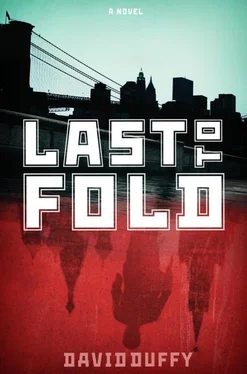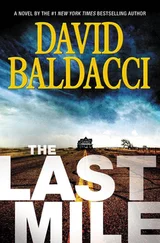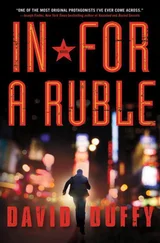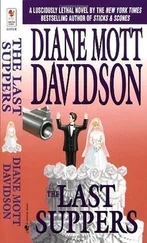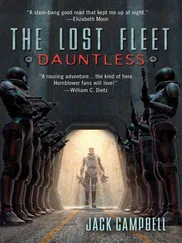Eva Mulholland lived at 211 East Seventieth Street, in an apartment that set someone back $5,250 a month—Dad, no doubt. Her occupation was student. She had $1,489 in her checking account. Her credit card charges indicated an affinity for the restaurants of Tribeca and the boutiques of SoHo and the Meatpacking District. She’d spent Christmas in the Caribbean and spring break in London and Moscow. Being a Mulholland wasn’t all bad.
Not all good, either. Eva had a record—a guilty plea to a marijuana possession charge two years earlier and another to shoplifting three months ago. Two suspended sentences—and two stints in rehab. Before the first bust, she had three thousand dollars deposited into her checking account every month. Electronic transfer from her father’s account. Since she got out of the detox center on Riverside Drive that had set her folks back sixty-five thousand dollars (for the first visit), her allowance had been cut by two-thirds. Dad’s idea of a tight leash.
The thing most of us don’t think about—or don’t want to think about—is how much information we generate on ourselves every day. Our appetites, our preferences, our habits and routines, our families, jobs, and finances. Most everything we do leaves a trail. Every phone call, e-mail, Web search, cash withdrawal, purchase, bill payment, trip, car rental, insurance claim, you name it. The trick is connecting up all those data points, among the billions and billions of others permanently stored in data-miners’ databases, to put together a profile of a person or tell you what someone is up to. That’s what the Basilisk does better than anything out there. I know. I use everything out there.
Having dispensed with the warm-up acts, I turned to the main event. The file on Felicity Mulholland was illuminating—up to a point. She’d married Rory in 2004. If I were being spiteful, I might have expected her to have led the Upper East Side trophy-wife life since then. I was wrong. No charges at Madison Avenue boutiques. No lunches at overpriced French restaurants where nobody pays attention to the food. A few evenings out—concerts at Carnegie Hall and Lincoln Center—but not many. She paid regular, not overly frequent, attention to her hair, face, and nails. She’d taken a Christmas trip to London, flying coach, but stayed only one night at an innocuous hotel in Hammersmith, and flown home the next day. Paid cash for the airline ticket. No shopping, no theater, no restaurants. She made a similar trip in February. Polina and I had lived in London. My first foreign posting with the KGB. She’d never shown any interest in Hammersmith.
Before she married Mulholland, Felicity used the last name Kendall and lived in a rental on West Fifty-eighth Street for two years. Before that, she didn’t appear to live anywhere for three. Before that, she lived in a studio apartment in Queens, near LaGuardia Airport—a single woman, no Eva, no kids of any kind. All of which was accounted for by the fact that the real Felicity Kendall died when she was struck by a drunk driver on Queens Boulevard in 1997. Polina picked up her identity in 2000. The Basilisk came up empty on Polina Barsukova, which suggested she was already using another name when she arrived here. Hard to avoid concluding that Polina had something to hide. Question was, from whom? My leading candidate would be husband number two. Jealousy was part of his makeup, he believed firmly in getting even, and he had a reputation for cruelty and ruthlessness that I knew to be one hundred percent well deserved.
I’d heard they’d split, but that was ten years ago. I’d also heard she’d been carrying on an affair with Kosokov. They both dropped from sight after 1999. Guess I’d assumed they’d gone off together, to the extent I’d thought about it. I’d been exiled, after all, partly by her, partly by the Cheka, partly self-imposed. I might not even be thinking about any of this today without Ivanov’s item on Kosokov this morning. That was another factor to be considered.
A loud arrrr-oooo-gahhhh reverberated through the space. Our doorbell—Foos’s contribution to office ambience. He likes to hit it on the way in. Pig Pen called out “Pizza!” in response. A few moments later, the hulk of a six-foot-five mountain man dressed in black filled my door, holding a half-chewed slice.
“Man, you are definitely hangin’ in the wrong ’hood,” the boom-box voice boomed.
The first time you meet him—maybe a few times after that—Foos is an intimidating sight. For openers, he’s two hundred sixty pounds big. The weight is evenly distributed. He’s not fat, but no one would call him muscled either. His preferred form of exercise is walking to his next meal. He’s in his midforties, with a sharp face and black eyes—but unlike Mulholland’s, his sparkle with curiosity and humor. A large, pointed nose runs left to right as you look at him. His mouth opens mostly on the right side, adding to his lopsided appearance. He wears heavy black rectangular glasses with chunky lenses and carries a thick mane of black curly hair that cascades around his shoulders, arms, and chest. If he ever cut it, the barber would need a pickup to haul away the clippings. Everything about him shouts eccentric, if not downright strange, and in his case, you can judge a book by its cover. Some people march to their own drummer—Foos has his own rock group. The thing I can never figure is, whenever he shows up with a new girlfriend—roughly every other month—she looks like she stepped out of a Ralph Lauren ad. He, of course, treats this like it’s perfectly natural. As Artie Shaw once observed, women aren’t attracted to Mick Jagger by his looks. Artie should know—he married Ava Gardner and Lana Turner.
“Didn’t see many of your friends up there, that’s true,” I said. “Bernie asked me to help. Mulholland’s his biggest client.”
“Ah, the Cardinal Consigliere. That explains it. He knows all the best people.”
“He helps pay the rent.”
“True enough, much as I don’t like to admit it. But you and Bernie have all you’re getting from me. If there’s any justice, that scumbag will do at least five years.”
I hadn’t been completely honest with Mulholland about my business. I do have a partner. We have a handshake deal that I’ll never disclose his involvement. In fact, our entire partnership is based on a handshake, which can be nerve-racking since Foos is unpredictable, to put it mildly. “Scumbag” is the moniker he applies to most of our clients, especially the successful ones, his views unmitigated by his own fortune. But he has special reason to dislike Mulholland.
Foos, or Foster Klaus Helix as his birth certificate says, is a certified genius and certainly paranoid. Maybe all geniuses are a little wacko, I don’t know, he’s the only one I’ve ever met. He grew up in Palo Alto and dropped out of high school, but by the time he was twenty, he had a Ph.D. in mathematics and computer science from Stanford. He came east to take a position at the Institute for Advanced Study in Princeton, the place Einstein hung his hat for thirty years. He got interested in relational data, as he calls it—what one thing can tell you about another, what two things can tell you about a third, what three things can tell you about a thousand. That led him to the work being done by companies like ChoicePoint and Seisint and LexisNexis, which maintain some fifty billion data files on virtually every American—people in other countries, too—which they make available to marketers looking for new ways to sell people things they don’t need and government agencies looking for new ways to keep an eye on the body politic under the pretext of fighting crime, terrorism, or whatever evil comes along to supplant terrorism. State security by another name.
Читать дальше
